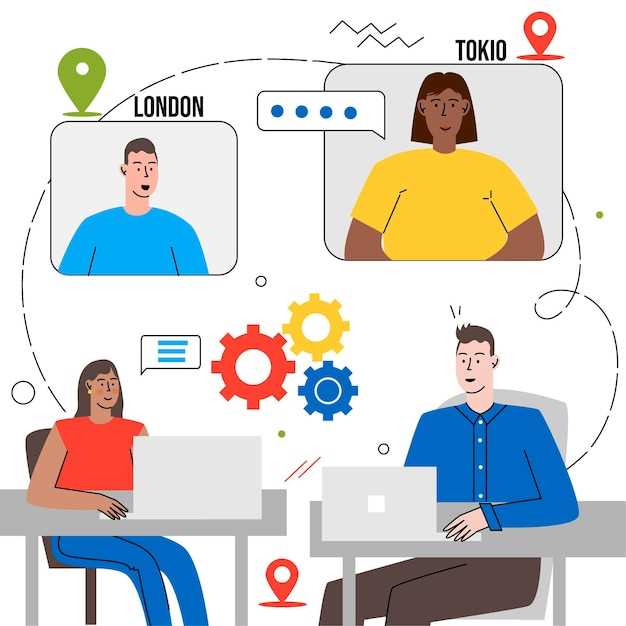
Revolutionary methods and instruments are necessary when establishing a geographically dispersed organization of individuals working towards a common objective. The concept of assembling a workforce remotely involves unique challenges and opportunities that require creative solutions.
Exploring groundbreaking approaches to curate a cohesive unit, equipped with the right tools and strategies, can lead to enhanced productivity and communication among team members. By leveraging the power of technology and effective communication channels, organizations can pave the way for success in the virtual workspace.
Embracing Remote Work Culture: Key Strategies

As businesses adapt to the changing landscape of work, the shift towards remote work culture has become increasingly prevalent. In order to thrive in this new environment, it is essential for organizations to implement effective practices that foster collaboration, communication, and productivity among their virtual teams.
Establish Clear Communication Channels
One of the fundamental aspects of remote work culture is the ability to communicate effectively with team members who may be geographically dispersed. By establishing clear channels for communication, such as video conferencing, instant messaging, and project management tools, organizations can ensure that information is shared efficiently and collaboratively. Encouraging open dialogue and regular check-ins can help to build trust and camaraderie among team members, despite physical distance.
Cultivate a Sense of Community
Building a remote work culture that fosters a sense of community and belonging is essential for maintaining team morale and engagement. Encouraging virtual team-building activities, celebrating milestones and achievements, and creating opportunities for casual conversations can help to strengthen relationships among team members. By cultivating a supportive and inclusive environment, organizations can boost employee satisfaction and performance, even in a remote setting.
Implementing Efficient Communication Solutions
In a remote work environment, effective communication among team members is crucial for success. Implementing the right tools and strategies can help facilitate seamless collaboration, streamline workflows, and foster a sense of unity among team members.
- Choose Communication Platforms Wisely: Select platforms that offer a variety of features such as chat, video conferencing, and file sharing to accommodate different communication needs.
- Establish Communication Guidelines: Set clear expectations for how and when team members should communicate, ensuring everyone is on the same page.
- Encourage Active Participation: Foster a culture of open communication where team members feel comfortable sharing their ideas, providing feedback, and asking questions.
- Utilize Project Management Tools: Incorporate tools that allow team members to track project progress, assign tasks, and communicate effectively to ensure all deadlines are met.
- Provide Training and Support: Offer training sessions and resources to help team members familiarize themselves with new communication tools and techniques.
By incorporating these strategies into your remote team communication plan, you can enhance productivity, strengthen relationships, and create a more cohesive and engaged team dynamic.
Building a Strong Company Culture Remotely
Creating a cohesive and positive environment within a company is essential for achieving mutual goals and boosting team morale. When team members are working remotely, it can be challenging to establish and maintain a strong company culture. However, there are various strategies and tools that can help foster a sense of belonging, teamwork, and shared values among remote employees.
1. Establish Clear Communication Channels
One of the key components of a strong company culture is effective communication. Remote teams must have clear and reliable channels for sharing information, discussing ideas, and addressing concerns. Utilize communication tools such as video conferencing, instant messaging, and project management platforms to ensure that team members stay connected and informed. Encourage open and transparent communication to build trust and promote collaboration.
2. Encourage Social Interaction and Team Building
Building a strong company culture remotely also involves fostering relationships and camaraderie among team members. Organize virtual team-building activities, such as online games, virtual happy hours, or virtual coffee breaks, to create opportunities for social interaction. Encourage casual conversations and personal connections to strengthen relationships and promote a sense of unity within the team.
- Organize virtual team-building activities
- Encourage casual conversations
- Foster relationships and camaraderie
By prioritizing clear communication and social interaction, remote teams can build a strong company culture that promotes collaboration, engagement, and a sense of community among team members.
Utilizing Team Bonding Activities and Events

Enhancing team cohesion and fostering strong relationships among team members is crucial for creating a cohesive and collaborative work environment. Team bonding activities and events play a vital role in achieving this goal by providing opportunities for team members to connect on a personal level outside of work tasks.
Benefits of Team Bonding Activities
Engaging in team bonding activities helps build trust, improve communication, and boost morale within the team. By participating in these activities, team members can develop a sense of camaraderie and unity, which can positively impact their collaboration and productivity in remote work settings.
Some effective team bonding activities include virtual team building games, online workshops, virtual happy hours, and collaborative projects. These activities allow team members to socialize, share experiences, and work together towards common goals, ultimately strengthening their relationships and enhancing team dynamics.
Organizing Team Bonding Events
In addition to regular team bonding activities, organizing special events can further enhance team cohesion and create memorable experiences for team members. Virtual team retreats, themed parties, and virtual team-building excursions are all great ways to bring team members together and create a sense of community.
It’s important to consider the unique interests and preferences of team members when planning team bonding events to ensure maximum participation and engagement. By incorporating a variety of activities and events, team leaders can effectively cultivate a positive team culture and strengthen the bonds between remote team members.
Ensuring Productivity and Accountability in Geographically Dispersed Teams
When managing teams that are spread out across different locations, maintaining productivity and accountability can be a challenging task. However, there are several strategies and tools that can be utilized to ensure that remote team members are staying on track and meeting their goals.
- Set clear expectations: Establishing clear goals and expectations for each team member is essential for ensuring productivity and accountability. Clearly communicate what is expected of each team member and provide regular feedback to keep everyone on the same page.
- Utilize project management tools: There are a variety of project management tools available that can help remote teams stay organized and on task. These tools can help track progress, assign tasks, and set deadlines to ensure that everyone is working towards the same goals.
- Encourage open communication: Communication is key in remote teams, as team members may not have the luxury of spontaneous conversations that can occur in a traditional office setting. Encourage team members to communicate regularly through video calls, chat platforms, and email to keep everyone informed and engaged.
- Implement regular check-ins: Schedule regular check-in meetings to discuss progress, address any problems or concerns, and provide updates on current projects. These meetings can help keep team members accountable and ensure that everyone is staying on track.
- Recognize and reward achievements: Acknowledging and rewarding team members for their hard work and achievements can help boost morale and motivation. Whether it’s a simple thank you or a more formal recognition program, showing appreciation for a job well done can go a long way in maintaining productivity and accountability in remote teams.
By implementing these strategies and utilizing the right tools, geographically dispersed teams can effectively ensure productivity and accountability, leading to successful outcomes for the organization as a whole.

